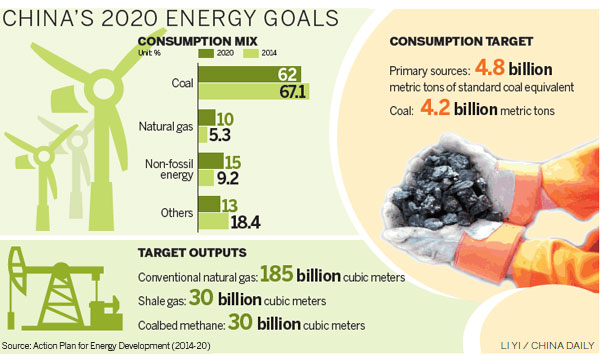Plan sets caps on energy use
Updated: 2014-11-20 08:07
By Du Juan(China Daily)
|
||||||||
 |
Coal's proportion of overall mix cut to 62% by 2020
China has announced plans to cap its annual energy use equivalent to 4.8 billion metric tons of standard coal by 2020, in an effort to cut carbon emissions.
The headline figure was revealed within the State Council's energy development strategy plan (2014-20), which also detailed moves to cut coal's share of the country's overall energy mix to 62 percent from the current 67 percent, and raise non-fossil fuel consumption to more than 15 percent.
Last week President Xi Jinping and US President Barack Obama announced both countries will curb their greenhouse gas emissions over the next two decades.
Under the agreement the US would cut its 2005 level of carbon emissions by 26 to 28 percent before 2025. China would peak its carbon emissions by 2030 and also aims to get 20 percent of its energy from zero-carbon emission sources by the same year.
"The plans mean that China has to keep primary energy consumption growth at lower than 3.5 percent annually over the next seven years," said Li Yizhong, president of the China Federation of Industrial Economics.
China has been working hard at improving its energy mix to be less dependent on coal, which Li said was a difficult but inevitable path to take to solve emission and pollution problems.
The country currently accounts for 21.5 percent of the world's energy demand, but Maria van der Hoeven, executive director of the Paris-based International Energy Agency, told the 2nd China Future Energy Forum last week in Beijing that as the economy continues to grow, that share is targeted to rise to 30 percent by 2020.
She said over the past decade, China has relied heavily on coal to keep up with its growing energy demand, but it now expects to reduce that to half of its total energy mix by 2040.
The new State Council plan caps the nation's yearly coal use at 4.2 billion tons by 2020 and also encourages the import of more energy-efficient coal as well as reducing its own domestic stockpiles.
Last year China consumed 4 billion tons of coal, 3.68 billion tons of which was locally produced and 320 million tons imported.
To solve the country's ongoing smog problems, China plans to cut 100 million tons of coal consumption in Beijing, Tianjin, Hebei and Shandong, the Pearl River Delta and the Yangtze River Delta by 2020.
To accelerate the development of clean energy, it will also raise natural gas use within its energy mix to more than 10 percent by 2020, which would see annual conventional natural gas output of 185 billion cubic meters.
By then, coalbed methane output will be 30 billion cu m, the plan said, and shale gas production slightly above that. China will also expand its bio-energy industry and establish a complete energy security system, aimed at achieving 85 percent energy self-sufficiency.
Melissa Stark, managing director of Accenture's New Energy Business, highlighted China's long-term commitment to shale gas development through its strongly resourced State-owned enterprises.

 Peng visits school for girls in Sydney
Peng visits school for girls in Sydney
 Ancient temple prepares for ritual
Ancient temple prepares for ritual
 Top 7 Chinese Internet brands in 2014
Top 7 Chinese Internet brands in 2014
 Chinese float to join Thanksgiving parade
Chinese float to join Thanksgiving parade
 China then and now through a lens
China then and now through a lens
 Stock Connect provides new opportunities
Stock Connect provides new opportunities
 India-China joint counterterrorism training exercise in Pune
India-China joint counterterrorism training exercise in Pune
 Crazy climbers take death-defying selfies
Crazy climbers take death-defying selfies
Most Viewed
Editor's Picks

|

|

|

|

|

|
Today's Top News
UN official lauds China's steps on carbon emissions
Man expected in court over deadly subway shove
APEC a win-win for US, China
Nations join hands for Antarctic study
Financing in China
Chinese M&A market expected to stay strong: Carlyle
China ramps up US bond purchases
China tops can-do list
US Weekly

|

|








